人教版英语初中九年级上册知识讲解,巩固练习(教学资料,补习资料):Unit 8 It must belong to Carla. 第2课时Section B(含答案解析)
文档属性
| 名称 | 人教版英语初中九年级上册知识讲解,巩固练习(教学资料,补习资料):Unit 8 It must belong to Carla. 第2课时Section B(含答案解析) | 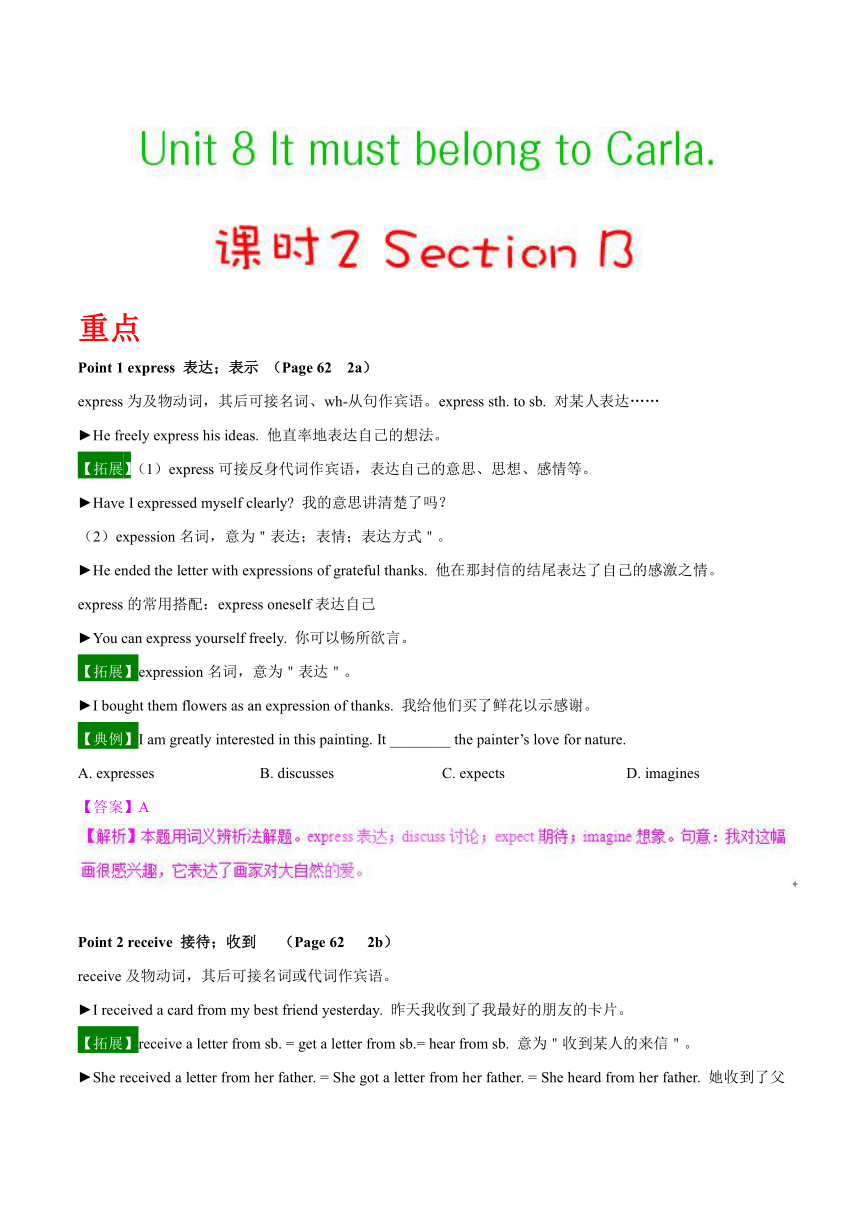 | |
| 格式 | zip | ||
| 文件大小 | 203.0KB | ||
| 资源类型 | 教案 | ||
| 版本资源 | 人教新目标(Go for it)版 | ||
| 科目 | 英语 | ||
| 更新时间 | 2019-09-21 11:01:14 | ||
图片预览

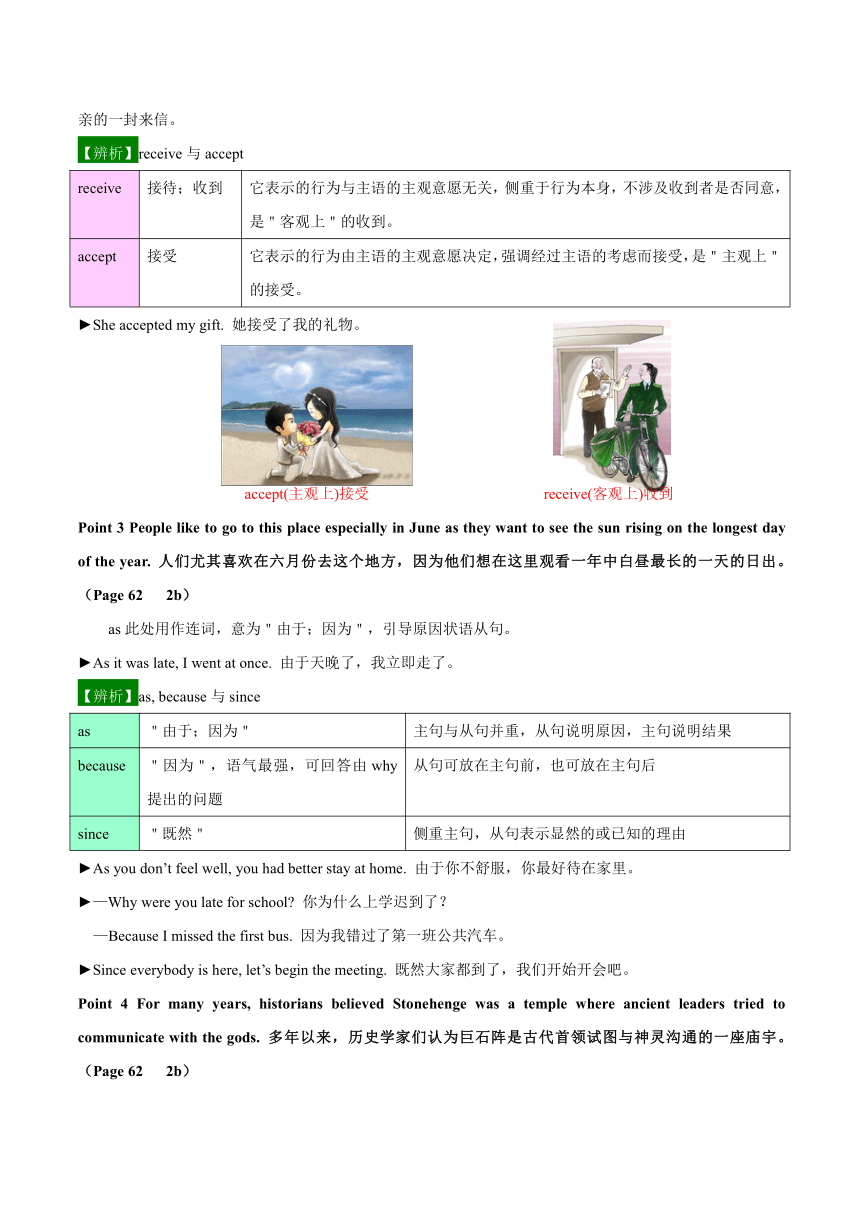
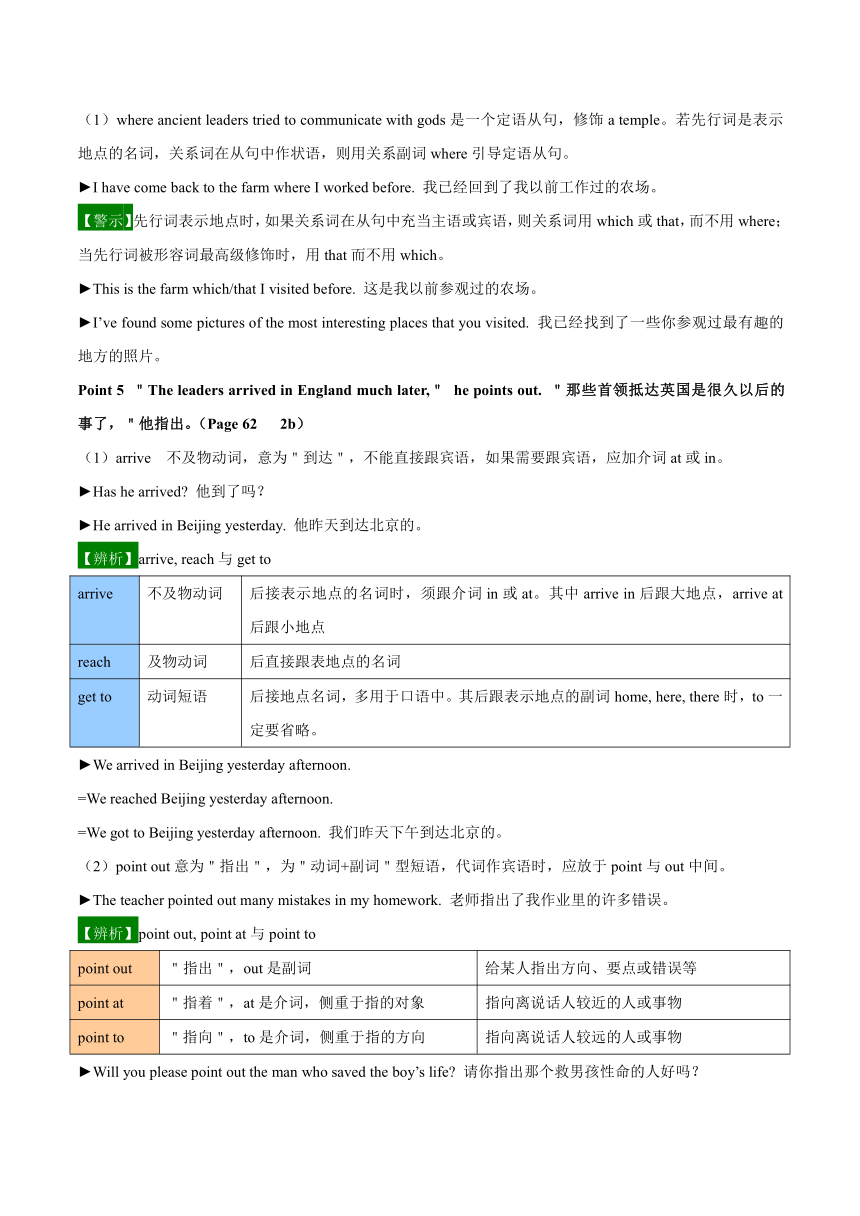
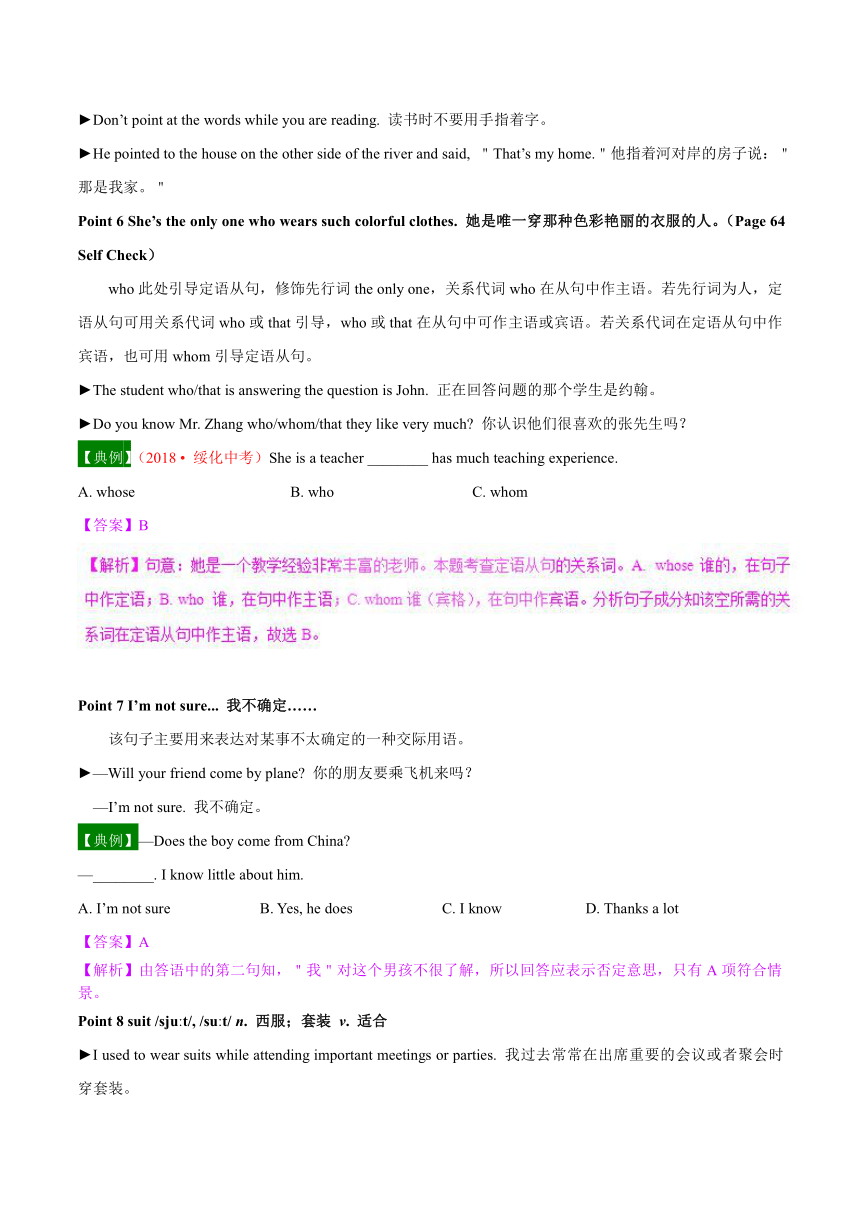
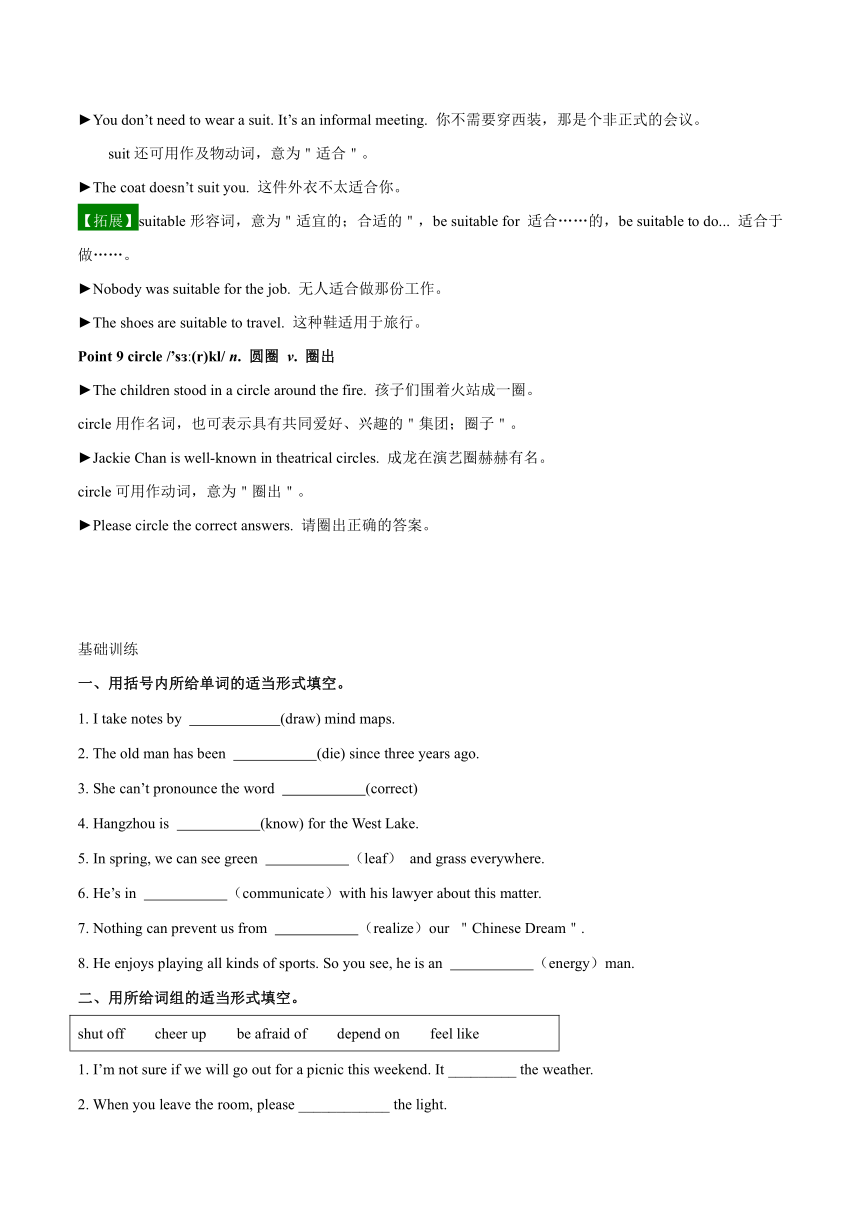
文档简介
重点
Point 1 express 表达;表示 (Page 62 2a)
express为及物动词,其后可接名词、wh-从句作宾语。express sth. to sb. 对某人表达……
?He freely express his ideas. 他直率地表达自己的想法。
【拓展】(1)express可接反身代词作宾语,表达自己的意思、思想、感情等。
?Have I expressed myself clearly? 我的意思讲清楚了吗?
(2)expession名词,意为"表达;表情;表达方式"。
?He ended the letter with expressions of grateful thanks. 他在那封信的结尾表达了自己的感激之情。
express的常用搭配:express oneself表达自己
?You can express yourself freely. 你可以畅所欲言。
【拓展】expression名词,意为"表达"。
?I bought them flowers as an expression of thanks. 我给他们买了鲜花以示感谢。
【典例】I am greatly interested in this painting. It ________ the painter’s love for nature.
A. expresses B. discusses C. expects D. imagines
【答案】A
Point 2 receive 接待;收到 (Page 62 2b)
receive及物动词,其后可接名词或代词作宾语。
?I received a card from my best friend yesterday. 昨天我收到了我最好的朋友的卡片。
【拓展】receive a letter from sb. = get a letter from sb.= hear from sb. 意为"收到某人的来信"。
?She received a letter from her father. = She got a letter from her father. = She heard from her father. 她收到了父亲的一封来信。
【辨析】receive与accept
receive
接待;收到
它表示的行为与主语的主观意愿无关,侧重于行为本身,不涉及收到者是否同意,是"客观上"的收到。
accept
接受
它表示的行为由主语的主观意愿决定,强调经过主语的考虑而接受,是"主观上"的接受。
?She accepted my gift. 她接受了我的礼物。
accept(主观上)接受 receive(客观上)收到
Point 3 People like to go to this place especially in June as they want to see the sun rising on the longest day of the year. 人们尤其喜欢在六月份去这个地方,因为他们想在这里观看一年中白昼最长的一天的日出。(Page 62 2b)
as此处用作连词,意为"由于;因为",引导原因状语从句。
?As it was late, I went at once. 由于天晚了,我立即走了。
【辨析】as, because与since
as
"由于;因为"
主句与从句并重,从句说明原因,主句说明结果
because
"因为",语气最强,可回答由why提出的问题
从句可放在主句前,也可放在主句后
since
"既然"
侧重主句,从句表示显然的或已知的理由
?As you don’t feel well, you had better stay at home. 由于你不舒服,你最好待在家里。
?—Why were you late for school? 你为什么上学迟到了?
—Because I missed the first bus. 因为我错过了第一班公共汽车。
?Since everybody is here, let’s begin the meeting. 既然大家都到了,我们开始开会吧。
Point 4 For many years, historians believed Stonehenge was a temple where ancient leaders tried to communicate with the gods. 多年以来,历史学家们认为巨石阵是古代首领试图与神灵沟通的一座庙宇。(Page 62 2b)
(1)where ancient leaders tried to communicate with gods是一个定语从句,修饰a temple。若先行词是表示地点的名词,关系词在从句中作状语,则用关系副词where引导定语从句。
?I have come back to the farm where I worked before. 我已经回到了我以前工作过的农场。
【警示】先行词表示地点时,如果关系词在从句中充当主语或宾语,则关系词用which或that,而不用where;当先行词被形容词最高级修饰时,用that而不用which。
?This is the farm which/that I visited before. 这是我以前参观过的农场。
?I’ve found some pictures of the most interesting places that you visited. 我已经找到了一些你参观过最有趣的地方的照片。
Point 5 "The leaders arrived in England much later," he points out. "那些首领抵达英国是很久以后的事了,"他指出。(Page 62 2b)
(1)arrive 不及物动词,意为"到达",不能直接跟宾语,如果需要跟宾语,应加介词at或in。
?Has he arrived? 他到了吗?
?He arrived in Beijing yesterday. 他昨天到达北京的。
【辨析】arrive, reach与get to
arrive
不及物动词
后接表示地点的名词时,须跟介词in或at。其中arrive in后跟大地点,arrive at后跟小地点
reach
及物动词
后直接跟表地点的名词
get to
动词短语
后接地点名词,多用于口语中。其后跟表示地点的副词home, here, there时,to一定要省略。
?We arrived in Beijing yesterday afternoon.
=We reached Beijing yesterday afternoon.
=We got to Beijing yesterday afternoon. 我们昨天下午到达北京的。
(2)point out意为"指出",为"动词+副词"型短语,代词作宾语时,应放于point与out中间。
?The teacher pointed out many mistakes in my homework. 老师指出了我作业里的许多错误。
【辨析】point out, point at与point to
point out
"指出",out是副词
给某人指出方向、要点或错误等
point at
"指着",at是介词,侧重于指的对象
指向离说话人较近的人或事物
point to
"指向",to是介词,侧重于指的方向
指向离说话人较远的人或事物
?Will you please point out the man who saved the boy’s life? 请你指出那个救男孩性命的人好吗?
?Don’t point at the words while you are reading. 读书时不要用手指着字。
?He pointed to the house on the other side of the river and said, "That’s my home."他指着河对岸的房子说:"那是我家。"
Point 6 She’s the only one who wears such colorful clothes. 她是唯一穿那种色彩艳丽的衣服的人。(Page 64 Self Check)
who此处引导定语从句,修饰先行词the only one,关系代词who在从句中作主语。若先行词为人,定语从句可用关系代词who或that引导,who或that在从句中可作主语或宾语。若关系代词在定语从句中作宾语,也可用whom引导定语从句。
?The student who/that is answering the question is John. 正在回答问题的那个学生是约翰。
?Do you know Mr. Zhang who/whom/that they like very much? 你认识他们很喜欢的张先生吗?
【典例】(2018 ? 绥化中考)She is a teacher ________ has much teaching experience.
A. whose B. who C. whom
【答案】B
Point 7 I’m not sure... 我不确定……
该句子主要用来表达对某事不太确定的一种交际用语。
?—Will your friend come by plane? 你的朋友要乘飞机来吗?
—I’m not sure. 我不确定。
【典例】—Does the boy come from China?
—________. I know little about him.
A. I’m not sure B. Yes, he does C. I know D. Thanks a lot
【答案】A
【解析】由答语中的第二句知,"我"对这个男孩不很了解,所以回答应表示否定意思,只有A项符合情景。
Point 8 suit /sju?t/, /su?t/ n. 西服;套装 v. 适合
?I used to wear suits while attending important meetings or parties. 我过去常常在出席重要的会议或者聚会时穿套装。
?You don’t need to wear a suit. It’s an informal meeting. 你不需要穿西装,那是个非正式的会议。
suit还可用作及物动词,意为"适合"。
?The coat doesn’t suit you. 这件外衣不太适合你。
【拓展】suitable形容词,意为"适宜的;合适的",be suitable for 适合……的,be suitable to do... 适合于做……。
?Nobody was suitable for the job. 无人适合做那份工作。
?The shoes are suitable to travel. 这种鞋适用于旅行。
Point 9 circle /’s??(r)kl/ n. 圆圈 v. 圈出
?The children stood in a circle around the fire. 孩子们围着火站成一圈。
circle用作名词,也可表示具有共同爱好、兴趣的"集团;圈子"。
?Jackie Chan is well-known in theatrical circles. 成龙在演艺圈赫赫有名。
circle可用作动词,意为"圈出"。
?Please circle the correct answers. 请圈出正确的答案。
基础训练
一、用括号内所给单词的适当形式填空。
1. I take notes by (draw) mind maps.
2. The old man has been (die) since three years ago.
3. She can’t pronounce the word (correct)
4. Hangzhou is (know) for the West Lake.
5. In spring, we can see green (leaf) and grass everywhere.
6. He’s in (communicate)with his lawyer about this matter.
7. Nothing can prevent us from (realize)our "Chinese Dream".
8. He enjoys playing all kinds of sports. So you see, he is an (energy)man.
二、用所给词组的适当形式填空。
shut off cheer up be afraid of depend on feel like
1. I’m not sure if we will go out for a picnic this weekend. It _________ the weather.
2. When you leave the room, please ____________ the light.
3. What do you ______________ eating today?
4. We went to the Children’s hospital to ___________ the sick children.
5. Lily ___________ the dark. And she doesn’t go out at night.
三、选择句子,补全对话。
A: Good morning, Jim.
B: Good morning, Mary. 1
A: Oh, it’s a French book.
B: 2 Do you know?
A: 3 He loves French very much.
B: No, 4 He has been away from school for a few days.
A: Is it Bob’s?
B: I don’t think so. He doesn’t like French at all.
A: Oh, I know. 5 Look, it has her name on it.
B: I think you are right. Let’s give it back to her.
A: OK. Let’s go.
A. I think it could be Tony’s.
B. I agree with you.
C. It must belong to Jane.
D. Look, there is a book under the chair.
E. Is it yours?
F. It can’t be his.
G. Whose book is it?
四、用所给词的适当形式填空。
1. The two old men often have fun ________ (play) chess here.
2. It must belong to ________(he).
3. Lucy might play the guitar very well. I think it’s ________(possible) true.
4. Listen! There must be someone ________(knock) at the door.
5. There are many children ________(play) games here.
6. There used to be many ________ (wolf), but only a few of them remain today.
7. I stayed up to watch TV last night. Now I feel ________ (sleep).
五、根据汉语完成句子。
1. ——你怎么啦,迈克?
——我的腿受伤了。
—________ ________ with you, Mike?
—My leg hurts.
2. 上周六,我和我的妹妹参加了杰克的婚礼。
Last Saturday, my sister and I ________ ________ wedding.
3. 在那个粉红色的盒子里有一些有价值的书,不要把它们扔了。
There are ________ ________ ________ in the ________ box. Don’t throw them away.
4. 当埃迪的妈妈进入他的房间时,他正在有兴趣地玩着电脑游戏。
When Eddie’s mom went into his room,he was ________ ________ ________ the computer games.
5. ——在桌子上有那么多蓝色的钢笔,哪个是属于你的,苏珊?
——我不确定。
—There are so many blue pens on the desk. Which ________ ________ you, Susan?
—________ ________ ________.
6. 你听到窗外奇怪的声音了吗?
Have you heard ________ ________outside the window?
7. 汤姆认为一定是邻居家的狗在玩耍。
Tom thought it ________ ________his neighbor’s dogs playing.
8. 我认为它太小了,不可能是一条狼。
I think it was ________ small ________ ________a wolf.
六、用方框里所给短语的适当形式填空。
belong to, run away, pick up, have fun, must be
1. Would you ________ the dictionary for me? It dropped on the floor just now. Thanks.
2. We went to the mountains last weekends. We ________ there.
3. I am not sure whom the jacket ________.
4. After running for 10 minutes, you ________ very tired.
5. When I wanted to say hello to the boy, he ________.
七、按要求完成句子。
1. It has been clear that Huangyan Island surely belongs to China. (改为同义句)
It has been clear that Huangyan Island ________ ________ ________.
2. I wonder who will explain all the things to us. (改为同义句)
I ________ ________ ________ who will explain all the things to us.
3. Grace didn’t come to school because she was ill. (改为同义句)
Grace didn’t come to school ________ ________her ________.
4. She is a singer, too. (改为否定句)
She________ a singer, ________.
5. The animal must be a wolf. (改为否定推测)
The animal ________ ________ a wolf.
能力提升
一、完形填空。
I used to live in my own room alone. But one day it all changed when my brother Mike asked to share my
1 . At first, my parents said "no" to him, but at last my mother agreed. I cried and asked my parents not to do this, 2 it didn’t work.
As soon as Mike entered my room, it began to become 3 . To my anger, he often left his unwashed clothes and toys everywhere!
One evening, I was doing some 4 on my computer while Mike was listening to music.
5 , I left my seat to get some water. A big surprise was waiting for me when I 6 . He was using my computer to play games. I had forgotten to save the homework. Sadly, he had closed my program 7 saving it — all I had done had disappeared! I 8 him. He cried a lot as my mother came and beat him. My mother also asked him to leave my room at once.
Then I did my homework 9 . At 10: 00 p. m, I finished it. When I was going to turn off the 10 , I saw the photo of my 11 that he had put on my table. I looked at his lovely face and remembered how 12 he was when my mom beat him. I really felt 13 . I went to see what he was doing. I found he was 14 in my parents’ bed. I kissed his face. He woke up, got up and said, "I’m sorry. I won’t bring you any more trouble."
I was so moved and said, "From now on, my room is not only mine. It is 15 !" That very night, Mike and I shared not only the room, but the bed.
1. A. clothes B. food C. room D. toys
2. A. because B. but C. or D. so
3. A. dirty B. empty C. quiet D. tidy
4. A. business B. homework C. reading D. shopping
5. A. Later B. Instead C. However D. Sometimes
6. A. danced B. fell C. returned D. slept
7. A. after B. by C. for D. without
8. A. agreed with B. heard from C. looked after D. shouted at
9. A. as well B. forever C. in the end D. once again
10. A. computer B. fan C. radio D.TV
11. A. brother B. cousin C. father D. grandfather
12. A. clever B. happy C. sad D. silly
13. A. bored B. excited C. proud D. sorry
14. A. jumping B. sleeping C. sitting D. singing
15. A. his B. hers C. ours D. theirs
二、阅读理解。
A
English words don’t stay the same. People need new words for new ideas and new inventions. Different words come into use, or old words are used in a new way.
English can be changed by borrowing words from other languages. The word "tomato" was borrowed from Mexico and "tea" came from China and so on. Now new space and science words are being borrowed from other countries, too. New words can be formed by adding two words together. "countryside" and
"earthquake" are made up of two parts. Sometimes new words are shorter forms of old words. The word
"photo" was made from "photograph" by cutting off the end of the longer word. "Plane" was made by cutting off the front part of "airplane". The names of people and products can become new words, too. Our
"sandwich" was named after a man called Sandwich and "sellotape"(透明胶带) was a name given by the company that first made the product.
1. New English words are needed because _________.
A. people use old words in a new way B. the old words are not enough
C. new ideas and new inventions appear all the time
2. Which of the following words was taken to English from another country?
A. Tomato. B. Sandwich. C. Countryside.
3. Which of the following words came from China?
A. Tea. B. Earthquake. C. Airplane.
4. How many ways of developing English words does the passage tell us?
A. Three. B. Four. C. Five.
5. The main idea of this passage is _________.
A. that the English language is always changing
B. how people name new products and inventions
C. how people use old words in a new way
B
Lisa never had the chance to know her father. He and her mother divorced when she was just a young child. Even though he didn’t move far, he never came to visit his children.
Lisa often wondered about her father. What did he look like and what was he doing? All she knew was his name: Jeff White.
After Lisa grew up, she became a nurse at a hospital, where she would help provide medicine and comfort for patients in their final days. A few weeks ago, she received a new patient whose name was Jeff White.
When Jeff came into his room, Lisa asked him if he had any children. Jeff told her that he had two daughters, Lisa and Elly. Lisa couldn’t hold her tears back. She told him, “I am Lisa, your daughter.”
Jeff embraced her, saying that he was not a good father. And the daughter held his hand and kissed him. Then Jeff began to sing This Magic Moment.
Jeff could have just weeks left to live, so Lisa wanted to make the most of the time she had with him. Lisa also brought her kid to the hospital to meet their grandfather. The kid made cards for him with the words, “I love you.”
6. What happened to Lisa when she was young?
A. Her father lost his job. B. Her mother died.
C. Her family moved to another country. D. Her father left the family.
7. What did Lisa know about her father? She knew her father’s ___________.
A. looks B. name C. hobby D. job
8. From the passage we know that __________.
A. Lisa has a brother. B. Lisa hates his father.
C. Lisa has a sister. D. Lisa’s father hates her daughter.
9. According to the passage, which of the following is Not True?
A. Lisa was a doctor at a hospital. B. Lisa’s kid loves Jeff.
C. Lisa cried when she knew Jeff was her father. D. Jeff was happy to see his daughter.
10. This passage mainly tells us that __________.
A. Kids should love their father. B. The father should love his kids.
C. Forgiveness(宽恕) is also a kind of love. D. Fathers shouldn’t leave their families.
真题练习
(2019 ? 苏州中考)—I’m going to take the kids to see the movie.
—__________. The kids are too young. That movie is not suitable for them.
A. You’d better not B. Good idea C. I think so D. No problem
2. (2018 ? 江苏无锡中考)You do not win respect by showing __________ you are, but what you’re able to do.
A. where B. who C. how D. when
3. (2019 ? 湖北宜昌中考)—Can you go to the opening ceremony of the Sports Center with me?
—_____________. I’ve been looking forward to it
A. I’m afraid B. It’s a pity C. Take it easy D. Sure, I’d love to
参考答案
基础训练
一、用括号内所给单词的适当形式填空。
4. well-known【解析】句意:杭州因西湖而出名。故填well-known。
5. leaves【解析】句意:在春天,我们到处都能看到绿色的树叶和小草。故填leaves。
6. communication【解析】本题考查communicate的派生词。句意:他就这件事一直与律师保持着联系。故所缺的词是communication。
7. realizing【解析】本题考查prevent sb. from doing sth. 这一固定搭配。句意:没有什么能够阻止我们实现我们的"中国梦"。故答案为realizing。
8. energetic【解析】本题考查energy的形容词形式energetic。
二、用所给词组的适当形式填空。
1. depends on【解析】句意:我不确定我们这周末是否出去野餐。这取决于天气。根据前面一句话可知后面这句话应该用一般现在时,主语是it,为第三人称单数,谓语动词depend也要用第三人称单数形式,加-s。
2. shut off【解析】句意:当你离开房间的时候,要关灯。从句please _________ the light为祈使句,应以动词原形开头,故用shut off。
3. feel like【解析】句意:你今天想要吃什么?根据助动词do可知这里应该用动词原形,故用feel like。
4. cheer up【解析】句意:我们去儿童医院让生病的孩子振作起来。这里考查的是动词不定式(to do sth.)作目的状语的用法,空格前有to,空格部分应该用动词原形,故用cheer up。
5. is afraid of【解析】句意:莉莉怕黑。她晚上不出去。根据后面一句话可知前面这句话应该用一般现在时,主语是Lily,be动词应该用is,故用 is afraid of。
三、选择句子,补全对话。
4. F【解析】根据下句的解释"他已经离开学校好几天了"可知,不可能是Tony的法语书。
5. C【解析】根据下句中的her name 判断,可知C项正确。
四、用所给词的适当形式填空。
1. playing 2. him
3. possibly 4. knocking
5. playing 6. wolves 7. sleepy
五、根据汉语完成句子。
1. What’s wrong 2. attended Jake’s
3. some valuable books; pink 4. having fun playing
5. belongs to; I’m not sure 6. strange noises
7. must be 8. too; to be
六、用方框里所给短语的适当形式填空。
4. must be【解析】本题用正确把握语境法解题。must be一定是,表示肯定的推测。
5. ran away【解析】本题用词语运用法解题。run away 跑掉。
七、按要求完成句子。
1. must be China’s
2. want to know【解析】本题用转换法解题。wonder想知道,相当于want to know。
3. because of; illness【解析】用简化法来做此题。because引导的从句可与"because of+名词"互相转换。注意要把ill由形容词转化为名词illness。
4. isn’t; either【解析】either也,放在句末,用于否定句中。
5. can’t be【解析】must be表示肯定的推测,否定推测要用can’t be表示,意为"不可能是"。
能力提升
一、完形填空。
文章大意:这篇短文讲述的是:一天我的弟弟Mike要求分享我的房间,当Mike一进入我的房间,它开始变得很脏。一天晚上,Mike正在听音乐的时候我在电脑前做家庭作业。悲哀地是,我离开我的座位去取些水的时候,他关掉我没有保存的程序,我做的所有作业都消失了。妈妈打了他,他哭得很伤心。当我看着照片上他可爱的脸时,我很抱歉。于是我决定和弟弟分享我的房间。
1.C【解析】考查名词及语境的理解。句意:但是一天当我的弟弟Mike要求分享我的房间时,一切都改变了。A. clothes衣服,B. food食物,C. room房间,D. toys玩具。据句意,故选C。
2.B【解析】考查连词及语境的理解。句意:我哭了请求父母不要这样做,但是它不起作用。A. because因为,B. but但是,C. or或者,D. so因此。据句意,故选B。
3.A【解析】考查形容词及语境的理解。句意:Mike一进入我的房间,它开始变得很脏。A. dirty脏的,B. empty空的,C. quiet安静的,D. tidy整洁的。据To my anger, he often left his unwashed clothes and toys everywhere!,故选A。
4.B【解析】考查名词及语境的理解。句意:一天晚上,Mike正在听音乐的时候我在电脑前做家庭作业。A. business商务,B. homework家庭作业,C. reading阅读,D. shopping买东西。据句意,故选B。
5.A【解析】考查副词及语境的理解。句意:过后,我离开我的座位去取些水。A. Later后来,B. Instead代替,C. However然而,D. Sometimes有时。据句意,故选A。
8.D【解析】考查动词短语及语境的理解。句意:我冲着他大嚷。 A. agreed with同意……,B. heard from收到……的信,C. looked after照顾,D. shouted at冲着……嚷。据句意可知选D。
9.D【解析】考查固定短语及语境的理解。句意:然后我再次做我的作业。 A. as well也,B. forever永远, C in the end最后,D. once again再次。据句意可知选D。
10.A【解析】考查名词及语境的理解。句意:当我要关掉电脑时,我看到我弟弟放在我桌子上的照片。A. computer电脑,B. fan电扇,C. radio收音机,D.TV 电视。据句意可知选A。
11.A【解析】考查名词及语境的理解。句意:当我要关掉电脑时,我看到我弟弟放在我桌子上的照片。A. brother弟弟,B. cousin表弟,C. father 爸爸,D. grandfather爷爷。据句意可知选A。
12.C【解析】考查形容词及语境的理解。句意:我看着他可爱的脸并且记得当我妈妈打他的时候,他是多么伤心。A. clever聪明的,B. happy高兴的,C. sad伤心的,D. silly愚蠢的。据句意,故选C。
13.D【解析】考查形容词及语境的理解。句意:我真的感觉抱歉。A. bored无聊的,B. excited兴奋的,C. proud骄傲的,D. sorry对不起的。据句意可知选D。
14.B【解析】考查动词及语境的理解。句意:我发现他正在我父母的床上睡觉。 A. jumping跳,B. sleeping睡觉,C. sitting坐,D. singing唱。据He woke up, got up and said, "I’m sorry. 据句意可知选B。
15.C【解析】考查代词及语境的理解。句意:从现在开始,我的房间不仅是我的,它是我们的。A. his他的, B. hers她的,C. ours我们的,D. theirs他们的。据句意可知选C。
二、阅读理解。
A
文章大意:本文介绍了英文单词的发展变化的问题,重点介绍了英语中四种构词方法。动笔前先要读懂全文,然后带着问题再读全文,找出关键句子完成阅读。有些问题需要自己分析总结,注意从关键单词提取重要信息。
1. C【解析】细节理解题。根据People need new words for new ideas and new inventions.可知选C。
2. A【解析】细节理解题。根据文中信息The word "tomato" was borrowed from Mexico and "tea" came from China and so on. 可知tomato是来自墨西哥,故选A。
3. A【解析】细节理解题。根据"tea"came from China可知选A。
4. B【解析】推理判断题。短文中提到四种构词途径:一是从其它语言引进单词,如:tomato;二是合成词,如:countryside;三是缩写词,如:photo;四是派生词,如:sandwich。所以选B。
5. A【解析】主旨大意题。本文主要介绍了英语单词的发展变化,重点介绍了英语中四种构词方法,故选A,英语是一直发展变化的。
B
文章大意:本文讲述的是一对父女之间的故事。因为与妈妈早年离婚,丽莎的父亲杰夫离开了她们并且从未来看过她们。丽莎长大后,当上了护士。一天,将不久于人世的杰夫来到医院看病,在这特殊的环境里,丽莎与父亲相认了,父亲认识到了自己的错误,女儿陪着父亲走过了人生最后的日子。
7. B【解析】细节理解题。题意:丽莎知道父亲的什么?A. looks外貌;B. name名字;C. hobby爱好;D. job工作。由第二段里的:All she knew was his name: Jeff White.可知,她所唯一知道的,就是父亲的名字。故选B。
8. C【解析】推理判断题。题意:从短文中,我们知道什么?A. Lisa has a brother丽莎有一个兄弟;B. Lisa hates his father.丽莎慨她的父亲;C. Lisa has a sister.丽莎有一个姐妹;D. Lisa’s father hates her daughter.丽莎的父亲。由第四段里的:Jeff told her that he had two daughters, Lisa and Elly.可知丽莎的父亲有两个女儿,即丽莎有一个姐妹。故选C。
9. A【解析】推理判断题。题意:根据短文内容,下面哪一个不是对的?A. Lisa was a doctor at a hospital.丽莎是医院的一位医生;B. Lisa’s kid loves Jeff.丽莎的孩子爱杰夫;C. Lisa cried when she knew Jeff was her father.当丽莎知道杰夫是她的父亲时,她哭了;D. Jeff was happy to see his daughter. 见到女儿,杰夫很高兴。由第三段开头的句子:After Lisa grew up, she became a nurse at a hospital可知,丽莎是医院的一名护士,不是医生。故A错了。故选A。
10. C【解析】主旨大意题。短文主要告诉我们什么?A. Kids should love their father.孩子应该爱父亲;B. The father should love his kids.父亲应该爱孩子;C. Forgiveness(宽恕) is also a kind of love.宽恕也是一种爱;D. Fathers shouldn’t leave their families.父亲不应该离开家人。本文主人翁丽莎,在面对曾经抛下她们母女的父亲时,选择了原谅,认了这位父亲,并且愿意陪伴他走过人生的最后一程。故选C。
真题练习
2. B【解析】句意:你不会因为你是谁而赢得尊重,而是你能做些什么来赢得尊重。A. where在哪里;B. who谁;C. how怎么样;D. when何时。结合句意可知,答案为B。
3. D【解析】句意:——你能和我一起去参加体育中心的开幕式吗?——当然,我很乐意。我一直期待着它。考查日常交际用语。A. I’m afraid我担心,后面一般需接名词、代词或句子;B. It’s a pity真遗憾,表示同情;C. Take it easy别紧张,用于劝慰;D. Sure, I’d love to当然,我很乐意,表示同意。根据I’ve been looking forward to it.,可知乐意去体育中心,前面三个选项都与句意不合,故选D。
同课章节目录
- Unit 1 How can we become good learners.
- Section A
- Section B
- Unit 2 I think that mooncakes are delicious!
- Section A
- Section B
- Unit 3 Could you please tell me where the restroom
- Section A
- Section B
- Unit 4 I used to be afraid of the dark.
- Section A
- Section B
- Unit 5 What are the shirts made of?
- Section A
- Section B
- Review of Units 1-5
- Unit 6 When was it invented?
- Section A
- Section B
- Unit 7 Teenagers should be allowed to choose their
- Section A
- Section B
- Unit 8 It must belong to Carla.
- Section A
- Section B
- Unit 9 I like music that I can dance to.
- Section A
- Section B
- Unit 10 You're supposed to shake hands.
- Section A
- Section B
- Review of Units 6-10
- Unit 11 Sad movies make me cry.
- Section A
- Section B
- Unit 12 Life is full of the unexpected
- Section A
- Section B
- Unit 13 We're trying to save the earth!
- Section A
- Section B
- Unit 14 I remember meeting all of you in Grade 7.
- Section A
- Section B
- Review of Units 11-14
